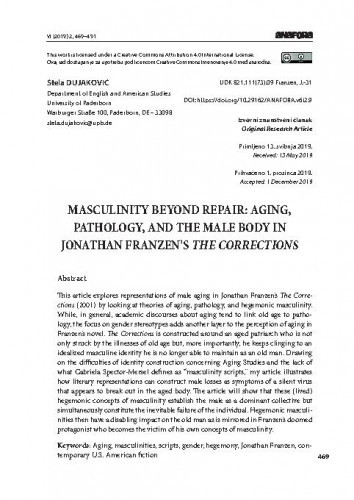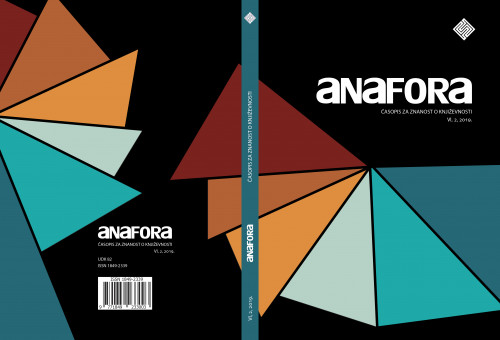This article explores representations of male aging in Jonathan Franzen’s The Corrections (2001) by looking at theories of aging, pathology, and hegemonic masculinity. While, in general, academic discourses about aging tend to link old age to pathology, the focus on gender stereotypes adds another layer to the perception of aging in Franzen’s novel. The Corrections is constructed around an aged patriarch who is not only struck by the illnesses of old age but, more importantly, he keeps clinging to an idealized masculine identity he is no longer able to maintain as an old man. Drawing on the difficulties of identity construction concerning Aging Studies and the lack of what Gabriela Spector-Mersel defines as “masculinity scripts,” my article illustrates how literary representations can construct male losses as symptoms of a silent virus that appears to break out in the aged body. The article will show that these (lived) hegemonic concepts of masculinity establish the male as a dominant collective but simultaneously constitute the inevitable failure of the individual. Hegemonic masculinities then have a disabling impact on the old man as is mirrored in Franzen’s doomed protagonist who becomes the victim of his own concepts of masculinity.; Rad istražuje prikaze muškog starenja u Korekcijama (2001) Jonathana Franzena s obzirom na teorije starenja, patologije i hegemonijske muškosti. I dok su, općenito gledano, akademski diskursi o starenju uglavnom skloni povezivanju starosti s patologijom, usredotočenost na rodne stereotipe otkriva slojevitost viđenja starenja u Franzenovu romanu. U središtu Korekcija nalazi se ostarjeli patrijarh kojega ne pogađa samo staračka bolest, već se on – što je još važnije – i dalje grčevito drži idealizirana muškog identiteta koji, kao starac, više nije u stanju utjelovljivati. Temeljeći se na poteškoćama oblikovanja identiteta u sklopu studija starenja te na nedostatku onoga što Gabriela Spector-Mersel definira „skriptama muškosti“, rad pokazuje kako književni prikazi mogu konstruirati muške gubitke kao simptome tihoga virusa koji se naoko javlja u ostarjelom tijelu. Rad pokazuje da ti (proživljeni) hegemonijski pojmovi muškosti uspostavljaju muškarce kao dominantan kolektiv, ali istodobno uvjetuju neizbježan neuspjeh pojedinca. Hegemonijske muškosti u tom smislu slabe starca, što se očituje u Franzenovu nesretnom glavnom liku koji postaje žrtvom vlastitih koncepata muškosti.
Sažetak

 Anafora : časopis za znanost o književnosti = [academic literary journal] : 6,2(2019) / glavni i odgovorni urednik, editor-in-chief Ružica Pšihistal.
Anafora : časopis za znanost o književnosti = [academic literary journal] : 6,2(2019) / glavni i odgovorni urednik, editor-in-chief Ružica Pšihistal.